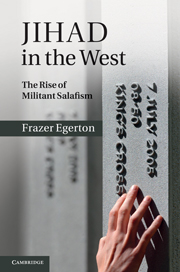Book contents
- Frontmatter
- Contents
- Acknowledgements
- Introduction
- 1 Mad mullah or freedom fighter? What is a militant Salafist?
- 2 What is wrong with these people?
- 3 Taking us everywhere: the role of the political imaginary
- 4 (Hyper)media and the construction of the militant community
- 5 Movement: from actual to ideological
- 6 Why me? The role of broader narratives and intermediaries
- Conclusion
- Bibliography
- Index
1 - Mad mullah or freedom fighter? What is a militant Salafist?
Published online by Cambridge University Press: 11 April 2011
- Frontmatter
- Contents
- Acknowledgements
- Introduction
- 1 Mad mullah or freedom fighter? What is a militant Salafist?
- 2 What is wrong with these people?
- 3 Taking us everywhere: the role of the political imaginary
- 4 (Hyper)media and the construction of the militant community
- 5 Movement: from actual to ideological
- 6 Why me? The role of broader narratives and intermediaries
- Conclusion
- Bibliography
- Index
Summary
If we are to begin to effectively study militant Salafism, we must first establish precisely what it actually is. Militant Salafism cannot be like pornography – allegedly recognisable but indefinable. Rendering the task here considerably easier is the willingness amongst militants themselves to offer explanations as to whom and why they are fighting, explanations that go a long way in explaining what militant Salafism is.
There are two main elements that are of crucial importance in explaining militant Salafism – the religious and the political. Each is explored below. Both are very important elements of militant Salafism, but they do not by themselves explain this particular militancy. There is a tendency amongst too many writing in this field to either dismiss the claims made by militant Salafists or uncritically regurgitate them. Their explanations should be taken seriously, but they also need to be placed in an appropriate context, specifically the particular metanarrative of what it means to be a Muslim.
Politics and its politicisation
Many of the more experienced and accomplished observers of Salafist militancy draw attention to its political metanarrative of Muslim suffering, the persecution of the ummah. Jason Burke, for example, argues that ‘Islamic militants' main objective is not conquest, but to beat back what they perceive as an aggressive West that is supposedly trying to complete the project begun during the Crusades and colonial periods of denigrating, dividing, and humiliating Islam’. They perceive a global conflict, one in which they feel compelled to participate.
- Type
- Chapter
- Information
- Jihad in the WestThe Rise of Militant Salafism, pp. 8 - 22Publisher: Cambridge University PressPrint publication year: 2011

